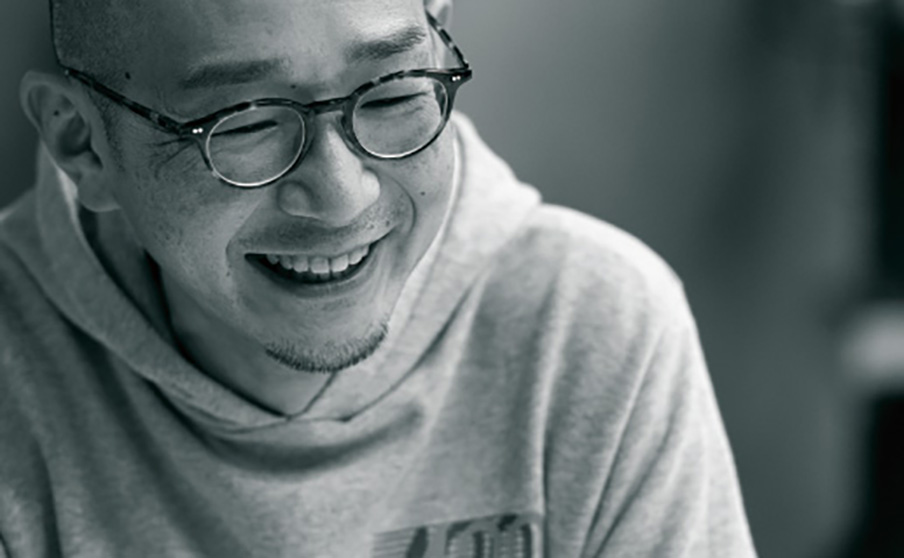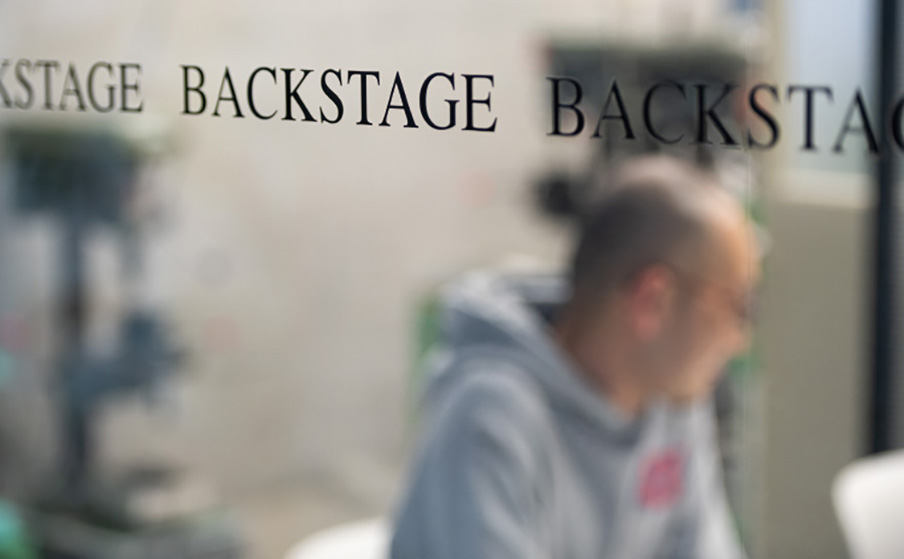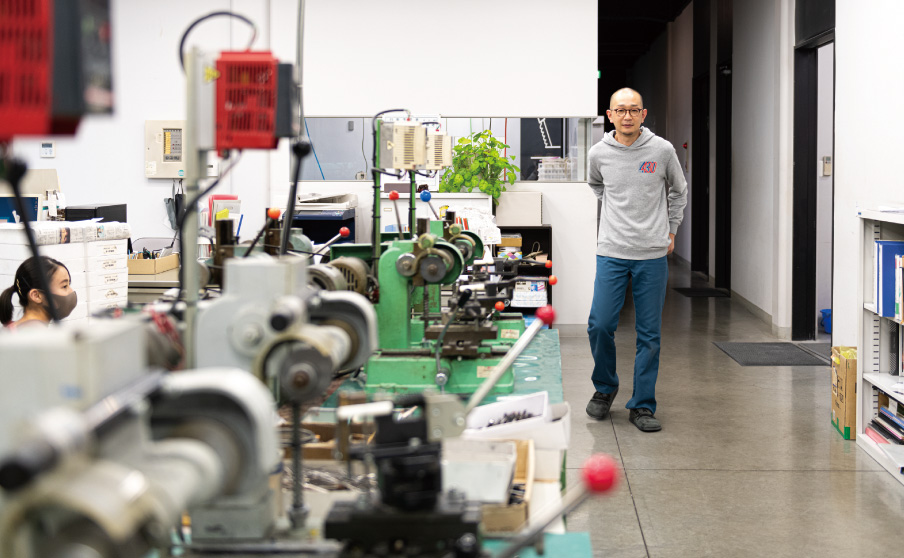BACKSTAGE Factory Manager/ CRAFTSMAN
Masaki Awata

One day something happened to spark Masaki Awata's interest in eyeglasses, which ultimately led him to his life work. He left his previous company and set his sights on becoming an eyeglass craftsman. With his family, he moved to Sabae in Fukui Prefecture. Today Awata is plant manager at BACKSTAGE, Kaneko Optical's in-house factory. He is the key craftsman who has supported the factory -- backbone of Kaneko Optical's craftsman culture -- since its launch. "It sounds great to say I was able to achieve my dream, but when I was about to take that first step toward becoming a craftsman, I felt as though I was hurling myself into a raging river. When I finally did jump in, it was to a world beyond my imagination."
Awata's previous job was with a mechanical design firm in Aichi Prefecture, mainly working on designs for fixtures used in manufacturing and machining auto parts. As he stared all day at a computer monitor, his eyes grew fatigued from contact lenses, so he began to benefit from some eyeglasses he'd previously not much used. He took a new interest in glasses, even as fashion accessories, and wondered if could be a way to work in the eyeglass field. While continuing at his day job, Awata took a correspondence course from an optician training school, learning about the eye and vision. In 2002, then age 26, he quit his job at the design firm and joined Kaneko Optical. His first assignment was at a shop just opened in the city of Nagoya, as a salesman.
"This is what I myself was hoping for. I regretted how in my old job I had worked in design without knowing the front line of the factory floor. This time I wanted to experience the direct interaction with customers for myself before going to work in manufacturing." However, Awata was to immediately hit into a brick wall at the store.
If it doesn't sell, get more fans.
Kaneko gives the same importance to its stores as to its craftsman worksites, and invests the same passion there. It's our chance to face the customer directly, providing our own space and experiencing the atmosphere and world view found there. It's not a matter of simply selling glasses and that's the end of it. Awata, with his engineering background, had to struggle from the start. "I really struggled over my speech. My boss was constantly telling me, 'your voice is too monotone; no emotion comes across, and you give people a cold impression.' Any number of times I would record my voice on my mobile phone saying, 'Welcome' and 'Thank You' on the way home from work to see how it sounded. That was my beginning, so not surprisingly I was last among the whole store staff to sell my first pair of glasses. Many others were better at selling, so I thought I would focus on communicating my individuality and the appeal of the brand to try to grow the store's fan base. I often spent more time face to face with customers than any other staff member."
Through steady effort and accumulated experience, Awata was finally promoted to store manager. Then, around age 30, he faced a turning point. In 2006, he was contacted to join the workshop Kaneko Optical had created to begin craftsman production on its own. In his conversations with Awata, President Kaneko had sensed Awata's interest in craftsmanship, and his desire to make Kaneko Optical products with his own hands, and for a long time had wanted to summon Awata to join the workshop. Awata's vision when he joined the company was to gain experience for at least 3 years on the sales floor, then become an eyeglass maker at around age 30. This hope was becoming reality.
Front line experience useful for artisanal manufacturing
Awata moved with his wife and children to Sabae in 2007 to embark on his life as an eyeglass craftsman. At the manufacturing site, where most of the work was done by hand, building on the foundation of Sabae's traditional techniques, the average age was a young 30 years old. Since the workshop had just been built, efficient divisions of labor, work flows, and other operational systems had still not been established, so at first everyone got a thorough exposure to all skills, from cutting and polishing through assembly. Workers there were filled with the spirit and energy embodied by the phrase, "we're making this together." "It was a factory overflowing with the love of eyeglasses and the passion for making. I was also learning how deep this field of hand-made traditional eyeglass can get. I immediately felt that I'd entered an amazing world. 15 years have since passed, and I still feel that way."
Nowadays Awata is in charge of the factory floor, and past the stage of exclusively focusing on making the product. As he hones his techniques, he's now in the position of training younger workers similar to what he was back then. "Most of the work at BACKSTAGE is done by hand, and it's very difficult to express and communicate the hand-made sensibility. Also, every maker is different and needs to be instructed in a way that matches their type. One person may not handle machines well, but is far more agile than others; another may have clumsy fingers but uses machines or makes work calculations brilliantly. I try to make appropriate work assignments in a way that builds everyone's skills. But since I took on this position, I have to say I've had a lot of sleepless nights (laughs)."
Some of his ambitious co-workers from back when he was just starting out as a craftsman have already gone independent and started their own companies or brands. But Awata hasn't moved from this location; he's still "Awata at Kaneko Optical."
"When I'm making eyeglasses, I'm always picturing the faces of customers I met when I worked in the store, or the faces of other customers who make the effort to come into our stores around the country. I think about what kind of glasses would please them, or what I could do to make the glasses last longer, so I never lose my motivation as an artisan."
Awata is the only craftsman at Kaneko Optical with store sales experience up to store manager, which is exactly why he can't be confined only to the role of craftsman, and what makes him indispensable to Kaneko Optical.
PROFILE
Masaki Awata
Born in Seto City, Aichi Prefecture. After graduating from Aichi Institute of Technology in Toyota City, Awata joined a local mechanical design firm. After four and half years employment there, he moved to Kaneko Optical in 2004. Promoted from sales staff to store manager at the "COMPLEX+Nagoya Store" (the current Nagoya store of Kaneko Optical), where he gained front line experience. In 2007, Awata moved to the BACKSTAGE manufacturing department, the company's in-house manufacturing site in Sabae, where he refined his technique as an eyeglass frame craftsman. He is currently factory manager and serves as a guide to those who have joined after him.



Awata's previous job was with a mechanical design firm in Aichi Prefecture, mainly working on designs for fixtures used in manufacturing and machining auto parts. As he stared all day at a computer monitor, his eyes grew fatigued from contact lenses, so he began to benefit from some eyeglasses he'd previously not much used. He took a new interest in glasses, even as fashion accessories, and wondered if could be a way to work in the eyeglass field. While continuing at his day job, Awata took a correspondence course from an optician training school, learning about the eye and vision. In 2002, then age 26, he quit his job at the design firm and joined Kaneko Optical. His first assignment was at a shop just opened in the city of Nagoya, as a salesman.
"This is what I myself was hoping for. I regretted how in my old job I had worked in design without knowing the front line of the factory floor. This time I wanted to experience the direct interaction with customers for myself before going to work in manufacturing." However, Awata was to immediately hit into a brick wall at the store.